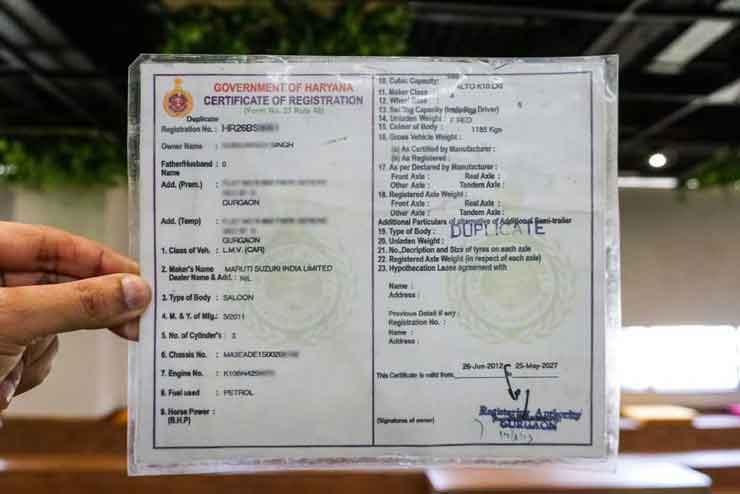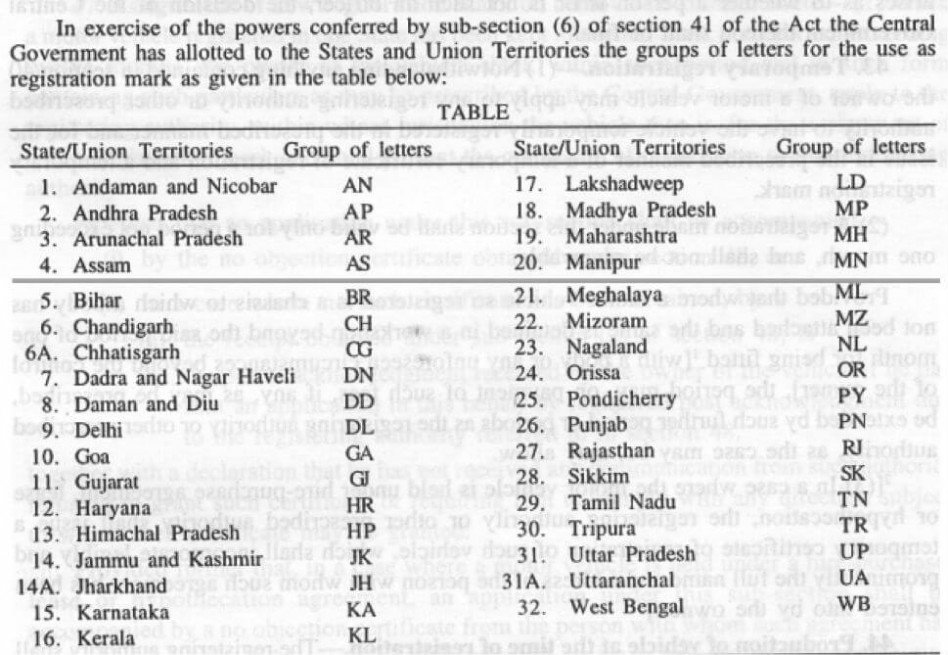Understanding Vehicle Registration Requirements Across States
In India, vehicle registration requirements can vary significantly between states. Each state issues its own registration plates and has jurisdiction over registrations within its borders. If relocating to another state, it’s important to be aware of the process for transferring or changing your registration.
Major Considerations for Inter-State Registration Changes
There are a few major factors to consider when changing the state of your vehicle registration:
- Eligibility requirements: States have different rules around who is eligible to register a vehicle there, such as requirements regarding residency or employment. Make sure you meet the new state’s criteria.
- Registration documentation: You’ll need the original registration certificate and current registration papers from the previous state to begin the transfer process. Certain additional documents like a no-objection certificate or address proof may also be required.
- Tax implications: Most states charge road tax or lifetime tax on new vehicle registrations. You may have to pay additional tax amounts to register in the new state depending on rules regarding tax credits for the previous registration period.
- Emission testing: Some states mandate vehicles pass an emission test on transfer. Be prepared for associated costs of getting your vehicle emission certified if required. Checking requirements upfront will help you prepare properly and smoothly navigate the registration transition between states.

Initiating the Registration Transfer Process in Bihar
Now that you understand the larger regulatory landscape, let’s dive into the specific steps for transferring your Maharashtra registration to Bihar:
Contacting the Bihar RTO
The first step is to contact the Regional Transport Office (RTO) in Bihar that has jurisdiction over the area where you’ll be residing. Provide them your current registration details and documents. They can guide you on the formal process.
Applying for a No-Objection Certificate
Maharashtra requires owners to obtain a no-objection certificate (NOC) from the home RTO before a registration can be transferred to another state. Apply for this at your local RTO in Maharashtra along with requisite application forms and fees.
Submitting Documents at the Bihar RTO
Once you have the NOC in hand, submit it along with the following key documents at the Bihar RTO:
- Original registration certificate
- Current registration papers
- Address proof for residence in Bihar
- PUC (pollution under control) certificate
Undergoing Vehicle Fitness and Registration Inspection
Officials will inspect your vehicle to check roadworthiness before approving the transfer. You may need to address any issues highlighted during inspection.
Paying Applicable Taxes and Fees
Depending on your vehicle’s age and type, taxes like lifetime tax, road tax and transfer fee are applicable. Pay all dues to complete the registration process.
Receiving New Registration Papers
Once all processes and payments are cleared, Bihar RTO will issue new registration papers and a plate with a fresh registration number in the state series.
Important Considerations for Changing Registration
While transitioning registrations can seem tedious, following some best practices ensures a smooth process:
Completing the Process within the Mandated Timeframe
States specify time limits, often 3 months, to complete the transfer after relocating. Exceeding this can attract penalties, so plan your application accordingly.
Maintaining Vehicle Documents in Order
Keep all ownership and insurance papers updated and valid. This demonstrates legal possession and avoids complications during RTO processes or inspections.
Factoring in Processing Time
RTO workloads vary. Allow a few extra weeks beyond minimum anticipated time for approval if relocating for work. This mitigates risks of delays.
Retaining Scanned Originals of Key Papers
Scan important documents like RC, PUC certificate before submitting originals. This helps in case you need records for reference during the transition period. Addressing these considerations can help you navigate the inter-state **vehicle registration transfer processes **seamlessly.
Finishing Touches Before Wrapping Up the Transfer
Once your new Bihar registration is issued, a couple final steps help complete the transition smoothly:
Updating Insurance with New Registration Details
Inform your insurer about the registration change in writing. They’ll issue an updated cover note reflecting your new plates and state.
Notifying Financiers of Liens on Loan Amounts
If you availed a loan against the vehicle, the financier likely has a lien on the old registration. Notify them in writing about the updated registration details.
Checking in with Originating RTO on Closure
Confirm with Maharashtra RTO that they have cancelled the previous registration from their records. Request a written acknowledgement for your reference.
Getting Familiar with Rules in the New State
Take time to understand revised norms regarding road tax payment cycles, emission tests timing and other procedures in Bihar going forward. Wrapping up all handoffs properly brings the inter-state registration transition process to a successful completion.
Key Differences to Note between Maharashtra and Bihar Registration Processes
While overall registration procedures are similar across states, a few key distinctions are worth flagging between Maharashtra and Bihar:
Tax Structures and Rates
Maharashtra charges lifetime tax as a one-time amount based on vehicle type and purchase cost. Bihar levies annual road tax paid during renewal. Check applicable rates.
Permit Requirements
Commercial vehicles often require special permits for inter-state operation. Bihar may have different permit rules than Maharashtra for your vehicle category.
Documents in Regional Languages
Most documents and forms are accepted in Hindi in Bihar versus Marathi or English preferences in Maharashtra RTOs. Have translations ready if needed.
Updated PUC Norms
Emission standards vary across states. Bihar’s latest PUC testing protocols may differ from those applicable previously in Maharashtra. Paying heed to such variations helps you comply with Bihar’s unique vehicle registration processes seamlessly on transfer.
Rectifying Errors or Issues Post-Transfer
Despite best efforts, occasional glitches may occur during or after the inter-state registration transition. Here are tips on issue resolution:
Minor Errors on Registration Documents
For clerical errors, approach the issuing RTO with relevant documents for correction. A simple petition often suffices.
Challenges with Insufficient Documents
If critical papers are missing, request certified copies from the originating Maharashtra RTO to validate ownership history.
Discrepancies in Tax Payments
Cross-check amounts with RTO records and reconcile any mismatches right away to avoid penalties on dues.
Changes Required Post-Inspection
If vehicle fails fitness inspection later, work with Bihar RTO to address the cited issue(s) and re-inspect promptly while registration is still valid. Always aim to address issues professionally and as per laid procedures for an efficient solution. Prompt follow-ups are key.
Key Takeaways for Safe Registration Handling
To summarize this detailed guide:
- Thoroughly research state-specific registration rules before transfer to avoid uncertainties.
- Initiate the transfer process well in advance to avoid rushing or missing deadlines.
- Present your vehicle, documents and payments as prescribed to seamlessly navigate RTO procedures.
- Inform all concerned stakeholders in writing about the registration change for their required updates.
- Address post-transfer issues confidently by promptly following applicable grievance redressal mechanisms.
Adhering closely to these practices ensures you transition your vehicle registration to Bihar smoothly in accordance with all regulatory guidelines.

 Career Progression at Big 4 Accounting Firms
Career Progression at Big 4 Accounting Firms